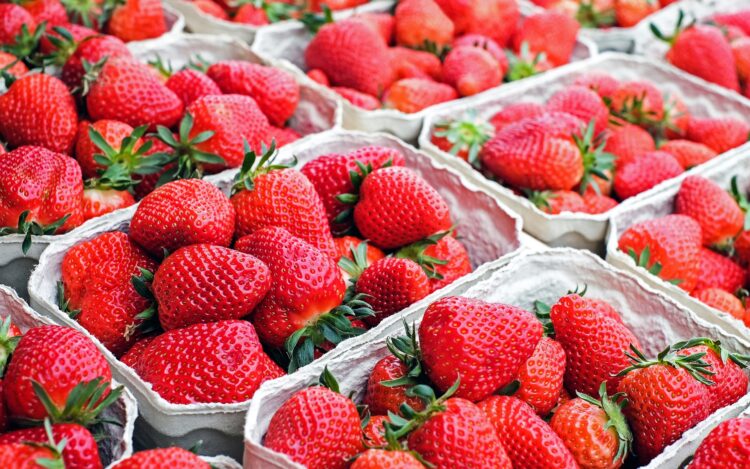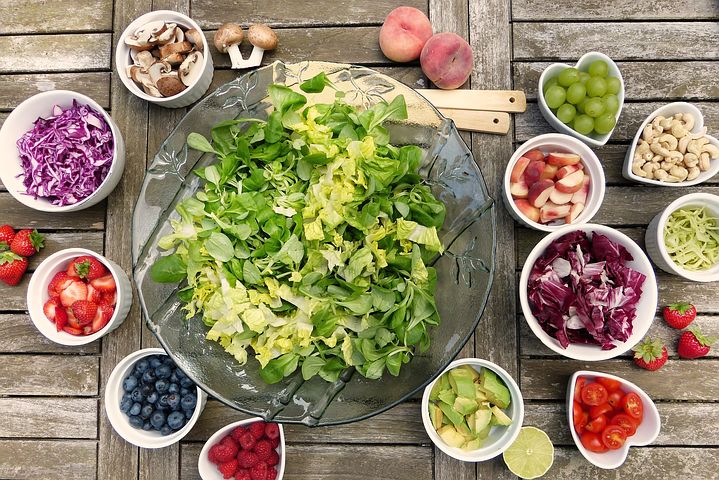Fresh Fruit and Vegetable Month – June 2019
Summertime brings back memories of working in my grandma’s garden. We would gather up the fresh green okra, warm red tomatoes, bright yellow squashes, and dark purple eggplant in the morning before the heat of the day and then have the freshest, most flavorful (and colorful) supper that evening.
Fruits and vegetables contain the vitamins, minerals, and nutrients your body needs to stay healthy. A healthy diet full of fruits and vegetables can actually help prevent the risk of chronic diseases such as heart disease, type II diabetes, and obesity. In-season produce is fresher and tastier than produce that has been shipped and stored…and since June is Fresh Fruit and Vegetable Month, there’s no better time to enjoy fresh produce!
Try this fresh, veggie-packed Ratatouille this week as a summer favorite your family is sure to love! (Recipe courtesy: https://cookingmatters.org/recipes/ratatouille)
Ingredients:
- 1 small red onion
- 2 medium cloves garlic
- 1 small eggplant
- 1 medium zucchini
- 1 medium yellow squash
- 1 large tomato
- 3 Tablespoons canola oil
- 1 teaspoon dried basil
- 1 teaspoon dried oregano
- ¼ teaspoon salt
- ¼ teaspoon ground black pepper
Directions:
1. Preheat oven to 425°F.
2. Rinse and peel the onion and garlic. Rinse the eggplant, zucchini, squash, and tomato.
3. Dice the onion and eggplant into ½-inch pieces. Slice zucchini and squash into ½-inch slices. Chop tomato and mince garlic.
4. In a medium bowl, add the onion, eggplant, zucchini, squash, garlic, oil, basil, oregano, salt, and black pepper. Toss until veggies are well coated.
5. Coat a baking sheet with non-stick cooking spray. Spread veggies out in a single layer so they do not touch. Bake for 20 minutes. Remove from oven.
6. Add tomato to baking sheet. Return baking sheet to oven. Bake, stirring occasionally, until veggies are golden crisp, about 15–20 minutes more.
Enjoy!
Logan, EFENP student employee
National Strawberry Month – 2019

Many North Carolinians look forward to fresh strawberries each spring. Strawberries are a popular fruit with 94% of American households eating strawberries each year. Although strawberries can now be bought in a grocery store year round, these strawberries, usually from California, are not as sweet and juicy as the locally grown strawberries. Strawberries are grown locally in all fifty states.
In 2018, North Carolina farmers grew about 1,000 acres of strawberries that produced about 12.5 million pounds of berries. Compared to the 1 billion pounds grown in California, production is small but still provides over $21 million in income to North Carolina growers. The big difference in strawberries from California and North Carolina are the types of strawberries grown. California grows strawberries that can be packed and shipped while strawberries grown in North Carolina do not ship well and are consumed locally. In North Carolina you can pick your own or buy freshly picked strawberries at roadside or farmers markets.
The harvest time for strawberries in North Carolina is late April through early June. Fresh Strawberries are a popular and refreshing treat. Strawberries are great fresh but they can also be enjoyed as a healthy snack in a homemade smoothie like the one below.
Strawberries have high levels of antioxidants, vitamins, and fiber. Eight strawberries provide 140 percent of the recommended daily intake of Vitamin C for kids. With only 55 calories per cup, strawberries are a great snack.
Be sure you celebrate May as National Strawberry month by enjoying fresh strawberries locally grown in North Carolina. You can make it a fun family event by taking everyone to a local pick-your-own strawberry farm. You can find a pick-your-own farm near you at http://www.pickyourown.org/NC.htm
James Wynne – EFNEP Intern
Eating Healthy on a Budget
Eating healthy on a budget may seem difficult but it can be done. With a little knowledge and
- Shop and Prepare at Home – The best way to save money and eat healthy foods is to shop and prepare the food yourself. However, to eat healthy on a budget at home still requires a strategy to purchase healthy low-cost foods. The first step to successfully prepare a healthy low-cost meal is to plan your grocery list.
- Plan Your Meals – usually for a week at the time. Choosing budget-friendly recipes with healthy ingredients that are easy to prepare. Check out our other blog posts for healthy, low cost meals. Try cooking large portions with inexpensive ingredients which can save both time and money. Use leftovers for lunches or to make stews and casseroles.
- Be a Smart Shopper – Make a grocery list that only includes the ingredients you need to prepare the meals and stick to it when you go shopping. Only purchase what you know you’re going to use so you don’t end up wasting a lot of what you buy.
- Look for Discounts and Special Deals – Finding the best deals can help anyone on a budget. You can save by stocking up on your favorite products or staples when they’re on sale. Just make sure the food doesn’t expire soon.
- Don’t Shop When Hungry – Being hungry causes you to stray from your grocery list and buy things you don’t need on impulse. Eat a healthy snack before you go shopping.
- Choose Whole Foods – brown rice or bags of peas are less expensive than buying unhealthy processed foods. You can also buy whole foods in larger quantities which makes them cheaper per unit.
- Buy Store Brands – Store brands are often of equal quality as the name brands but are just less expensive.
- Avoid Junk Food – Soda, crackers, cookies, prepackaged meals and processed foods offer little nutrition, often have unhealthy ingredients and can also be very expensive. By not having unhealthy foods you can use the money saved to buy healthier items.
- Buy Cheaper Cuts of Meat – use these in burritos, casseroles, soups, stews or stir fries. You also might consider eating less meat and replacing it with other proteins. Protein sources such as eggs or canned tuna are inexpensive and nutritious.
- Buy Produce in Season – this can be more economical and nutritious. When produce is not in season may be better to buy frozen fruits and vegetables. You can use only what you need and keep the rest for later.
There are a lot of foods available that are inexpensive and healthy. You can prepare many delicious and inexpensive meals by using eggs, beans, seeds, frozen fruits and vegetables, cheaper cuts of meats and whole grains. These foods taste great, are nutritious, and can be less expensive. Try adding these foods into your daily routine to save you money and help you eat well this month!
James Wynne – EFNEP Intern
Tumbleweed Pasta
Makes 8 Servings
Ingredients:
2 cups cooked Rotini noodles
1 cup (8 ounces) salsa
1 can yellow corn, drained and rinsed
1 medium onion, diced
½ green pepper, diced
1 can black beans, drained and rinsed
½ cup shredded cheddar cheese
Directions:
- Dice green peppers and onions.
- Drain cans of corn and beans and place in a large bowl.
- Add salsa, green pepper, and onion.
- Stir together.
- Add cooked Pasta and mix well.
- Sprinkle cheese on top.
National Nutrition Month

Did you know that March is National Nutrition Month? Yes, it sure is! I’ve got the info to get you eating healthy for the month and easily continue through the year. I know you thought 31 days would be a breeze, but 365 days of nutritional intake can take your health to a new level. For starters, it is important to know the recommended amounts of fruits and vegetables for the day. Fruits and vegetables are important in your everyday diet because they provide the body with numerous vitamins and minerals. Adult men and women should make sure they are getting at least 2 cups of fruits per day and 3 cups of vegetables per day. Children should make sure they are getting 1 to 1 ½ cups of fruits and vegetables for the day. So how can you incorporate more fruits and vegetables in your diet?
Here are some tips to help increase the fruits and vegetables into your diet:
- Mix up a breakfast smoothie made with low-fat milk and fruits of your choice.
- Add color to salads with baby carrots, grape tomatoes, spinach leaves, or mandarin oranges.
- Place colorful fruit where everyone can easily grab something for a snack on the run.
- Stuff an omelet with vegetables.
- Examples of vegetables to include in your omelet are peppers, tomatoes, carrots, or onions.
- Try crunchy vegetables instead of chips with your favorite low-fat salad dressing for dipping.
- Grill colorful vegetable kabobs packed with tomatoes, green and red peppers, mushrooms, and onions
- Make fruit your dessert. An example of fruit as a dessert would be cutting a banana lengthwise and topping it with a scoop of low-fat yogurt.
Do these ideas make you want to eat more fruits and vegetables? Yes….No…Maybe? If it didn’t stimulate your appetite, let’s see if the suggested recipe below will bring excitement.
Chili is a quick and easy dinner to make. I’m going to tell you a secret about the chili…it contains vegetables and it is healthy! This is a secret that you should pass on to family and friends.
Ingredients
1 can beans, low-sodium undrained (pinto, kidney, red, or black 15.5 ounces)
1 can corn, drained (15 ounces, or 10-ounce package of frozen corn)
1 can crushed tomatoes, undrained (15 ounces)
chili powder (to taste)
Directions
1) Place the contents of all 3 cans into a pan.
2) Add chili powder to taste.
3) Stir to mix
4) Continue to stir over medium heat until heated thoroughly.
5) Refrigerate leftovers.
Recipe from: https://whatscooking.fns.usda.gov/recipes/supplemental-nutrition-assistance-program-snap/3-can-chili
Enjoy and come back soon to see what is being cooked up!
-Aerial Woody, EFNEP Intern